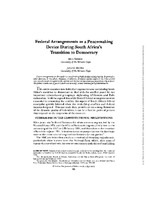| dc.contributor.author | Steytler, Nico | |
| dc.contributor.author | Mettler, Johann | |
| dc.date.accessioned | 2019-07-22T11:06:57Z | |
| dc.date.available | 2019-07-22T11:06:57Z | |
| dc.date.issued | 2001-01-01 | |
| dc.identifier.citation | Steytler, N., & Mettler, J. (2001). Federal Arrangements as a Peacemaking Device During South Africa's Transition to Democracy. Publius: The Journal Of Federalism, 31(4), 93-106. doi: 10.1093/oxfordjournals.pubjof.a004922 | en_US |
| dc.identifier.uri | http://hdl.handle.net/10566/4722 | |
| dc.description.abstract | This article examines how federal arrangements were used during South
Africa's transition to democracy to deal with the conflict posed by two
important ethnic-based groupings: right-wing Afrikaners and Zulu
nationalists. It will be argued that while limited federal arrangements were
successful in containing the conflict, this aspect of South Africa's federal
enterprise quickly faltered when the underlying conflicts and federal
impetus dissipated. This case study, then, provides an interesting illustration
of the dynamic quality of federalism; it can be a flexible political process
that responds to the exigencies of the moment. | en_US |
| dc.language.iso | en | en_US |
| dc.publisher | Publius: The Journal of Federalism | en_US |
| dc.subject | South Africa | en_US |
| dc.subject | Federal units | en_US |
| dc.subject | non-Africans | en_US |
| dc.subject | Inkatha Freedom Party | en_US |
| dc.subject | Constitution | en_US |
| dc.title | Federal arrangements as a peacemaking device during South Africa's transition to democracy | en_US |
| dc.type | Article | en_US |

